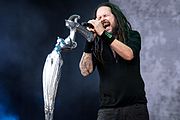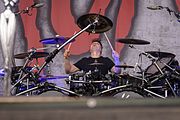
Korn
Korn (stylized as KoЯn) is an American nu metal band from Bakersfield, California, formed in 1993. The band is notable for pioneering the nu metal genre and bringing it into the mainstream.
For other uses, see Korn (disambiguation). Not to be confused with Corn.
Korn
Originally formed in 1993 by three members of the band L.A.P.D., Korn's current lineup features founding members James "Munky" Shaffer (guitar); Reginald "Fieldy" Arvizu (bass); Brian "Head" Welch (guitar, backing vocals); and Jonathan Davis (lead vocals, bagpipes), with the addition of Ray Luzier (drums) in 2007, replacing the band's first drummer David Silveria.
Korn made a demo tape, Neidermayer's Mind, in 1993, which was distributed free to record companies and on request to members of the public.[3] Their debut album Korn was released in 1994, followed by their commercial breakthrough, Life Is Peachy, in 1996. The band first experienced mainstream success with Follow the Leader (1998) and Issues (1999), both of which debuted at number one on the Billboard 200.[4] The band's mainstream success continued with Untouchables (2002); Take a Look in the Mirror (2003); and See You on the Other Side (2005).
A compilation album, Greatest Hits Vol. 1, was released in 2004, spanning a decade of singles and concluding the band's recording contract with Immortal Records and Epic Records. They signed to Virgin Records, releasing See You on the Other Side in 2005, and an untitled album in 2007. The band's other recent albums, Korn III: Remember Who You Are (2010) and The Path of Totality (2011), were released via Roadrunner Records, with The Paradigm Shift (2013) being released via Prospect Park and Caroline Records. The Serenity of Suffering saw their return to Roadrunner Records, through which The Nothing was released on September 13, 2019. Their latest album, Requiem, was released via Loma Vista Recordings on February 4, 2022.
As of 2021, Korn had sold more than 40 million records worldwide.[5][6] Twelve of the band's official releases have peaked in the top ten of the Billboard 200, eight of which have peaked in the top five.[4] Seven official releases are certified platinum by the Recording Industry Association of America (RIAA); two are certified double platinum; one is certified triple platinum; one is certified five times platinum; and two are certified Gold.[7]
Korn has released seven video albums and 50 music videos. The band has released 48 singles, the most notable of which include "Blind"; "Got the Life"; "Freak on a Leash"; "Falling Away from Me"; "Here to Stay"; "Did My Time"; "Twisted Transistor"; "Coming Undone"; and "Get Up!"[8][9][10][11][12] Korn has earned two Grammy Awards out of eight nominations[13][14] and two MTV Video Music Awards out of 11 nominations.[15]
Artistry
Style and lyrics
Korn is identified as the pioneers of nu metal music, a form of alternative metal music which began in the mid-1990s.[238][239] While generally considered an alternative metal and nu metal band, the band has also been labeled as heavy metal,[240] grunge,[241] rap rock,[242] rap metal,[243][244] funk metal,[245][246] groove metal[247] and hard rock.[248] They are characterized by the style that incorporated downtuned guitars, a groove-heavy rhythm section, haunted atmospheric production, and dark lyrics.[244] Their lyrics focus on pain and personal alienation rather than traditional heavy metal themes.[249][250]
Historically, when Life Is Peachy was released, the band's music was not yet labeled "nu metal". Thus, in November 1996, Korn was described as "one of the key players in an American metal revival" alongside Deftones, "two bands that share the same roots".[251] In the music community, there have been disagreements whether the band should be considered as "heavy metal". In 2015, lead singer Jonathan Davis commented, "Yeah, we're heavy and downtuned, but metal, to me, is like Judas Priest and Iron Maiden, that's metal man. I always thought of us as a funk band."[252] Additionally, in an interview with Metal Hammer, Davis said that he had hated the "nu metal" tag. Korn is widely credited as the originators of the nu metal scene. It means that the genre was suddenly inundated with imitators of their sound.[253]
Many of Korn's first works are based on early experiences. The song "Daddy" was described by lead singer Jonathan Davis: "When I was a kid, I was being abused by somebody else and I went to my parents and told them about it, and they thought I was lying and joking around. They never did shit about it. They didn't believe it was happening to their son.... I don't really like to talk about that song. This is as much as I've ever talked about it..."[32][254][255] "Kill You" was written about Davis's experiences as a child with his stepmother.[256] Follow the Leader marked the first album where the majority of the lyrics did not have origins relating to early occurrences, with songs like "Justin" and "Pretty" written about incidents occurring during adulthood.[257]
Bassist Reginald Arvizu plays his instrument using both the techniques of fingerstyle and slapping. Jonathan Davis was said by author Doug Small to be "the eye of the storm around which the music of Korn rages."[258] Small described the band as "a basket-case full of contradictions."[258]
Influences
A few years before establishing Korn, James "Munky" Shaffer; Reginald "Fieldy" Arvizu; and David Silveria (who were three members of the funk rock band L.A.P.D.), alongside friend Brian "Head" Welch, all had the common influences of Red Hot Chili Peppers and especially the Faith No More album The Real Thing.[259][260] Likewise, Davis was greatly inspired by the adventurousness of The Real Thing upon its 1989 release: "It showed everybody you could do heavy music and not be 'metal'. It was something completely different."[261]
Munky later acknowledged the song structures and instrumentations of Faith No More in inspiring Korn's future songwriting: "Faith No More steered us in the direction where we ultimately ended up."[262] They became "fanatics" of Faith No More singer Mike Patton, researched about him, and traveled to the band's hometown of San Francisco in order to watch them play. In this way, they discovered Patton's avant-garde metal band Mr. Bungle, whose 1991 self-titled album had a long-standing impact on Korn's experimentation, dissonance, and eccentric stylings.[260][262] A notable example of Bungle's influence has been what Korn dubbed the "Mr. Bungle chord" (a flat fifth chord or "tritone"), which became a band trademark throughout their discography.[260][263]
Besides the projects of Patton, Korn had a wide range of influences that included groove-oriented metal acts such as Sepultura, Prong, and Biohazard, in addition to the dynamics and live performances of Rage Against the Machine and its frontman Zack de la Rocha. Head later explained that they tried to mix the weird elements of Bungle with catchy choruses and melodies, alongside the songwriting and grooves from those metal bands.[260] On the other hand, Fieldy discards any influence classic rock groups like The Rolling Stones and Led Zeppelin have had on Korn; "Nobody in the band ever listened to that stuff."[264]
Much of Korn's work has also been inspired by hip hop music, as suggested in the band's song "All in the Family" and the cover song of Ice Cube's "Wicked".[265][257][266] The band imitated the samples used by Cypress Hill, with Davis going as far to say "If there's no Cypress Hill there would be no Korn."[267]
In the Guitar World section "The Album that Changed My Life" of January 1997, Welch listed The Real Thing by Faith No More as the album that changed his life, while Arvizu named both the Red Hot Chili Peppers' Freaky Styley and Faith No More's Introduce Yourself.[268] Fieldy's biggest bass influences were Flea from Red Hot Chili Peppers and Les Claypool from Primus. He was also greatly inspired by Billy Gould's chemistry with his Faith No More bandmates and Stanley Clarke.[269] In 2015, asked about what record has stuck with him through the years, Munky first named 1992's Angel Dust by Faith No More, followed by Evil Empire by Rage Against the Machine and The Fragile by Nine Inch Nails.[270] For his part, David Silveria named Mike Bordin of Faith No More one of his biggest influences.[271]
Many reviewers point out stark similarities between the vocals of Davis and several techniques employed by Mike Patton, such as those from Angel Dust.[272][273][274][275][276] Davis' rhythmic and aggressive singing was also based on toasting, a reggae/dancehall vocal style that emphasizes rhythm and embellishments.[260]
The members of Korn are also influenced by Alice in Chains,[277] Pantera,[278] N.W.A,[279][262] Bauhaus,[280] Geto Boys,[279] Van Halen,[262] The Pharcyde,[262] Nine Inch Nails,[262] Deftones,[262] and John Zorn.[259][281]
In other media
They have contributed music to the soundtracks for movies such as The Crow: City of Angels,[282] I Know What You Did Last Summer,[168] Spawn,[283] End of Days[284] and Lara Croft Tomb Raider: The Cradle of Life. The music of Korn has also been featured on various television series, including South Park (which they starred as guests), Beavis and Butt-head,[283] Daria,[285] and The Simpsons.[283]
Legacy
Korn's debut album has been recognized for its influence on heavy music. Bands such as Coal Chamber and Limp Bizkit were inspired by the album's "churning rage, emphasizing similar grooves and song structures" and "the sound's hip-hop elements."[32] Slipknot, Machine Head, and Sepultura were also inspired by Korn's debut album.[32] The album launched the career of record producer Ross Robinson,[31] who later produced albums such as Three Dollar Bill, Yall by Limp Bizkit, Sepultura's Roots and Slipknot's first two albums.[286][287][288][289] Amy Lee of Evanescence also cited Korn as an influence growing up.[290][291] Mucc guitarist Miya said that Davis' intense personal expressions in Korn influenced him to do the same in his own music.[292]
Richard S. He of Billboard wrote: "More than any other album, Follow the Leader opened the floodgates for countless nu-metal acts to infiltrate the mainstream."[293] In the book Nu-metal: The Next Generation of Rock & Punk, Korn was marked as the third biggest nu metal band in the world.[294] Korn created a fan-base described by Doug Small and Eaton Entertainment as extremely loyal.[41]
Current members
Current touring musicians
Former members
Former touring musicians
Touring substitutes
Official band members timeline
Touring musicians timeline




